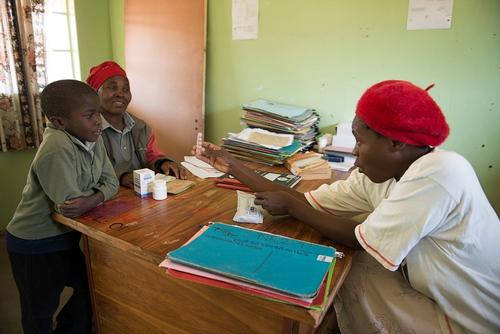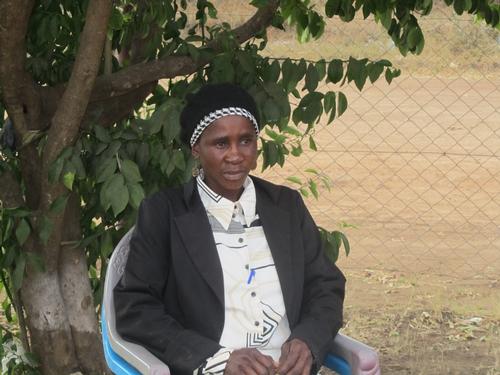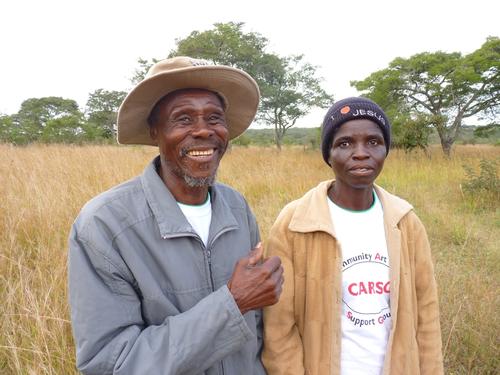Bhekululu Chasokela's hands no longer shake when he has to prescribe antiretroviral (ARV) treatment for HIV patients. He is a nurse and thanks to the ‘task shifting’ programme he has acquired the training to treat patients with HIV. “I had never done it before, and the first time I did it I felt really good knowing that I was helping a patient who I had known for a long time," he recalls proudly. Training nurses is one of the easiest ways to make ARV treatments available in remote areas. The programme is a straightforward, effective initiative launched in 2006 by Médecins sans Frontières (MSF) in Tsholtosho.
“Nurses are the only people we always see in our health centres. The fact they can prescribe antiretroviral therapy has helped us a lot,” says Sibongile Bhebhe, a 42-year-old woman who lives in Madona, about 100 km from Tsholotsho. She is HIV positive and did not begin to take ARV treatment until 2013. “I was waiting a long time for the doctor to come. I can't get to Tsholotsho hospital because it is a long way and transportation is very expensive for me," she says.
Improving access to antiretroviral treatment for patients in remote areas is the aim of the task shifting programme. It is a simple decentralisation initiative that entails training health professionals in remote rural areas that are far from the hospital to be more autonomous and manage patients with HIV.
Making treatment accessible to the greatest number of people possible is one of the main challenges in countries hard hit by the virus. According to the World Health Organisation, antiretroviral therapy reduces the risk of transmitting the virus by 96%. The latest figures from the Ministry of Health in Zimbabwe indicate that 72% of adults and 43% of children who need treatment are receiving it.
Taking treatment to where patients need it
“It's important to take the drugs and resources to where the people who really need it are - those most vulnerable and affected by HIV who has no access to hospitals," explains Guiomar Hernández, an MSF doctor and coordinator of the decentralisation team in Tsholotsho.
As Philimon Mgnui, MSF nurse in Tsholotsho, says “since the programme began in 2006, "the benefits for patients have been excellent, both by increasing the number of tests that have been carried out and in the adherence to treatment". “The programme has enabled a huge reduction in waiting lists to start antiretroviral therapy, there is better treatment adherence, and patients feel much better cared for," he explains.
It is estimated that currently half a million adults and 150,000 children are affected by HIV in Zimbabwe. For several years, MSF has been putting in place strategies in this African country aimed at establishing decentralised models suited to the real needs of the large number of sparsely populated rural areas.
Tsholotsho, in southern Zimbabwe, has a referral hospital and only one doctor from the Ministry of Health. The district is divided into 18 health areas, some of which have a population of up to 17,000. “Transport alone to the hospital in Tsholotsho from rural areas costs $5, an amount that many patients can't afford," explains Hernández. Thanks to the decentralisation strategy, many people can be treated at home or in health centres near their homes, rather than in centralised (and distant) facilities that are very difficult to access.
A matter of training
Over 30 nurses, both women and men, cover the 18 health areas in Tsholotsho district and attend training sessions twice a year. They are given theoretical and practical courses where they learn to identify patients and to perform HIV testing, screening, diagnosis and treatment of HIV-associated infectious diseases such as tuberculosis and meningitis, as well as clinical and immunological patient follow-up.
“With our team colleagues we developed a protocol that nurses apply when diagnosing a patient with HIV. We can now say that the nurses we have trained can do almost everything when it comes to managing HIV-positive people," explains Guiomar Hernández.
The first training programmes began in 2006 in four health centres in Tsholotsho: Sipepa, Pumula, Nkunzi and Makaza. These areas are all a long way from the hospital and have a high number of HIV-positive patients. MSF was responsible for giving the training and subsequent follow-up of health professionals.
In addition to training health professionals, the MSF medical team perform weekly monitoring. “We saw that they were gradually getting confident and managing patients. They have our support at all times, and when there are uncertain cases they schedule those patients to come on the same day as the MSF team visits the health centre, so that we can examine the patient together," explains Dr Hernández. “It has been very interesting to see how motivated the staffs of rural health centres are. They know that afterwards they have to deal with situations alone, and they take full advantage of our presence in the centre to continue learning."
Nurses are not the only professionals who are benefiting from the initiative. Laboratory scientists, microscopists, pharmacists, mental health auxiliary staff, and support groups, among others, have all been able to boost their autonomy in managing patients.
Since 2013, MSF has gradually been transferring its activities in Tsholotsho to the Ministry of Health of Zimbabwe. The programme "is an interesting strategy that allows knowledge to remain in place, regardless of whether we are there, and this is the key to both the success of the programme and the health of many patients in Tsholotsho," explains Dr Hernández.
*”Facing the virus” is a series of five stories in which Planeta Futuro and MSF explain how HIV programmes have changed the everyday lives of thousands of people living with HIV in Zimbabwe. MSF has been working on comprehensive HIV and TB programmes with a community focus for several years. The work is underpinned by pillars such as: simplifying treatment, redistributing HIV care between medical and non-medical personnel, integrating care into routine health services, and decentralising to rural areas. In Tsholotsho, MSF has been running an HIV and TB project for nine years. Having achieved good results, the organisation will be leaving the district in the next few months, but it will continue to treat HIV and TB in other parts of the country.







